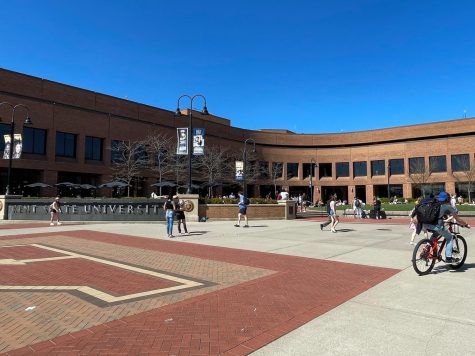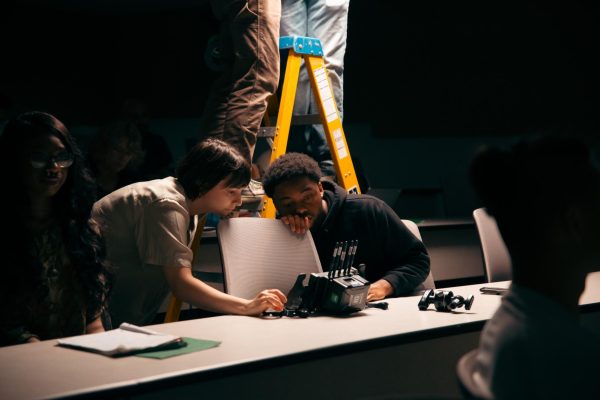Dream job
September 7, 2006
Kent State graduate Dave Holmes shares his ESPN experience, before and after
Sophomore broadcast major Ashleigh Klinger, freshman photojournalism major Caleb Jenkins and freshman broadcast major Mitch Cooper talk with Dave Holmes after he spoke with students about his job with ESPN and his career in journalism. ARIANE CAVIN | DAIL
Credit: Steve Schirra
On Tuesday, Nov. 16, 2004, Grant Thompson and Dave Holmes were under extreme pressure. They were the final two contestants on the 10th episode of ESPN’s “Dream Job.”
That night, Holmes’ dream came true when he won a one-year contract as an anchor for “SportsCenter” and a brand new car.
On Jan. 8, 2005, Holmes drove his Mazda 6 sports edition to Bristol, Conn., the home of ESPN. He graduated from Kent State that spring with a degree in broadcast journalism.
“I’m not someone who likes change, and moving to New England by yourself is intimidating,” Holmes said. “The greatest victory for me was not winning, but being able to let go of the unknown and just going for a dream.”
Holmes described his path leading to ESPN as exhausting. But he has loved sports for as long as he can remember, so quitting wasn’t an option, he said.
As a senior at Lake High School in his home city of Uniontown, Holmes turned the morning announcements into a TV show because of his interest in broadcasting. After a tour, he chose Kent State for the same reason.
“TV-2 is the reason I came,” he said. “I toured the campus and saw the station, and immediately I wanted to come to Kent State. I was more nervous for my first TV-2 audition than I was for the first night of ‘Dream Job.'”
His nerves got the best of him that first semester, and he didn’t make the cut. Instead he became an alternate, and he got called in one night to cover the sportscast. Five seconds into his report, the teleprompter went blank. Holmes got through the next four minutes by improvising and staying calm in spite of the technical glitch.
This earned Holmes a position as a TV-2 sports reporter for the next eight semesters. He went on to become the sports director and eventually the general manager, running the station while he was on “Dream Job.”
Kara Pospichel, who graduated with a bachelor’s degree in broadcast news last spring, watched Holmes on “Dream Job” that semester and was motivated by his ability to balance everything in his life at once.
“He is an inspiration for all of us still at TV-2,” she said.
Kara Pospichel, who graduated with a bachelor’s degree in broadcast news last spring, watched Holmes on “Dream Job” that semester and was motivated by his ability to balance everything in his life at once.
“He is an inspiration for all of us still at TV-2,” she said. “There is a light at the end of the tunnel. The many sleepless nights and hard work put into this major can, and will, pay off some day.”
However, getting himself onto “Dream Job” wasn’t as easy as Holmes made it appear. He auditioned for the show’s first season in 2003 — making it through two days of tests in Cleveland, making it to the final 50 regional people in Chicago and then all the way to New York City for the finals – only to be the last man cut and made an alternate.
“It was all so tiring that I wasn’t going to try out for season two,” he said. “I went golfing that morning to try to get it off my mind, but all I could think about was trying out for ‘Dream Job.’ So I walked in the Cleveland audition at the last minute, and I was the last man to try out.”
Holmes joked to Al Jaffe, the man in charge of hiring everyone at ESPN, saying, “You’d better not make me an alternate a second time.” Jaffe just looked away.
Holmes went home from the season two audition as an alternate. He scheduled his classes, and he paid his tuition. He wasn’t going to be on the show.
But then one morning a week before the show started, he was woken up by a phone call: They were adding two more spots. Holmes hung up without saying yes. He said he would think about it and call back.
“There I was afraid of disappointment and embarrassment,” he said. “But then I thought, ‘I’m really going to pass up the potential to be on ESPN in college?’ I had to go.”
The competitions on “Dream Job” were intense, physically and mentally. The first four weeks on the show Holmes said he was too focused on not messing up, and the last six weeks his health went downhill from exhaustion.
“It’s tough to be yourself in front of a million people when you’re paranoid of making mistakes,” he said. “By the last week of ‘Dream Job’ I was completely sick, popping pills of cold medicine between commercial breaks.”
Steve Bunin, an ESPN anchor, said Holmes’ ability to listen and work with other anchors during the broadcast was his winning quality.
“It isn’t easy for any sportscaster, let alone a young one, to adapt to that part of the job,” he said. “ESPN starts with ‘entertainment,’ and a major part of our job is balancing that with sports information. Too much of one or the other, at ESPN, is not a good thing, and he understood that very quickly.”
After winning “Dream Job,” graduating and moving into a small, expensive one-room apartment, Holmes’ life became somewhat surreal.
He was a 22-year-old anchoring on television’s most-watched cable network. It was an intimidating first day on the job, he said.
“The other anchors treated me great, but I was still so nervous because I didn’t know the slightest thing about the station,” Holmes said. “The place was so big that I was afraid of getting lost in the buildings. I remember thinking I should drop bread crumbs along the way so I could get back to the parking lot.”
Holmes worked two hours a day and four nights a week at ESPN.
“I admit it — I worked easy hours and talked about sports. I guess that’s why they call it a dream job,” he said.
However, Holmes still felt he underestimated how difficult the position would be.
“The difficulty level at ESPN was so much more than I thought,” he said. “When you sit at home and watch, you have no idea that every day the show is inches from falling apart.”
Holmes learned that it’s important to stay calm and collected on the air — one quality of a true professional that he will continue to use in his future broadcasting jobs. Do not let the audience know what’s going on behind the scenes or in your earpiece, he said.
Being stranded on live TV, like when the wrong tapes run or guests cancel, was another part of the job where Bunin felt Holmes exceeded expectations.
“We often get information about games or highlights literally seconds beforehand,” Bunin said. “Conducting interviews on national TV without appropriate prep time is not easy for any of us, least of all someone who is right out of college.”
Working with Holmes reinvigorated Bunin, and he said it was refreshing to go to work every day. However, Holmes’ contract with ESPN ended in January.
“It was non-negotiable,” Holmes said. “They told me very early on, ‘No disrespect but don’t expect to stay, so plan accordingly.’ I understood. There are 10,000 established adults trying to get in, and I was holding their spot and just warming the seat for someone who deserved it more.”
Holmes said he wants to use this opportunity to get experience reporting and working in a local market, like all of the other anchors at ESPN have had. He has spent the last eight months hiring an agent, which he described as a long and frustrating process, and interviewing for various positions around the country. He said he is hoping to land something on the east coast.
“I don’t think I’ll ever have the same kind of fun that I had on ‘Dream Job,'” Holmes said. “There aren’t too many people in the world who get a chance to be an anchor at ESPN. It’s a pretty cool feeling to know what it’s like on the inside of those walls in Bristol.”
Once, Bunin gave Holmes some advice: “If you have talent and enough moxie to stick with it and move anywhere for any money, you will succeed.”
It looks as if Holmes will continue to be successful.
“Like I said, I’m really conservative. I didn’t even try mayonnaise until I was 13,” Holmes said. “So for me to let go and get off the golf course, for me to move across the country and tackle this job: Now I know I can go anywhere and do anything.”
Contact features editor Erica Crist at [email protected].























